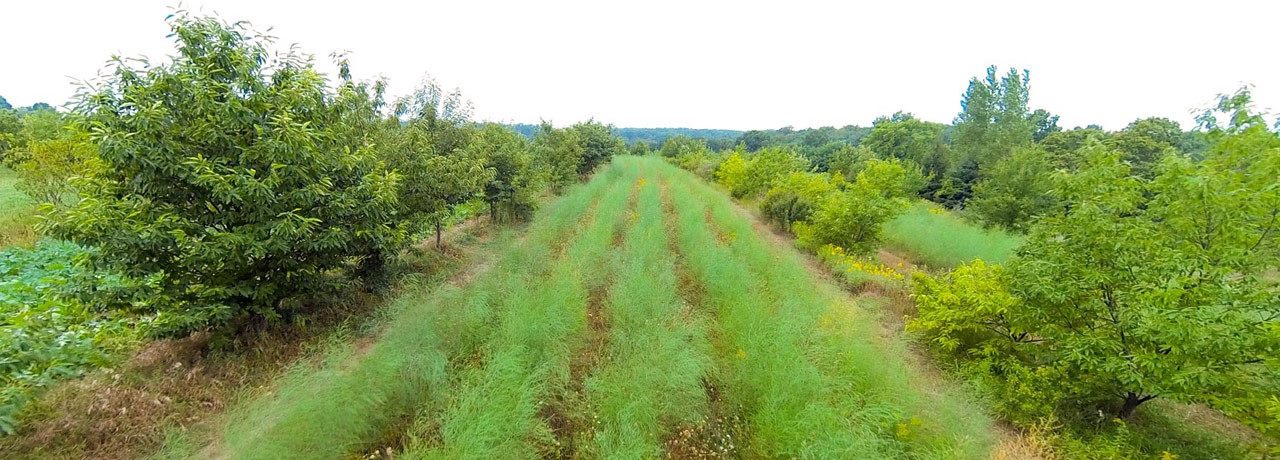
PRESQUE ISLE, Maine — The University of Maine Presque Isle’s latest distinguished lecture speaker, Mark Shepard, thinks that everyone everywhere could be growing more food, with less work.
“We need to design every region to be ecological production regions. We have to mechanize things,” Shepard, the owner of New Forest Farm in Wisconsin and author of “Restoration Agriculture,” told a crowd of students, faculty and community members at UMPI Oct. 3.
Shepard grows everything from winter squash and peppers for the Organic Valley cooperative to apples, pears, chestnuts, hazelnuts, mushrooms and livestock for retail and wholesale markets. Annual crops are planted in between rows of fruit, nut and timber trees, and all the crops are treated with benign neglect and not sprayed, with livestock providing pest control and fertilizer, and plants left to die if they can’t survive on their own.
The Shepards have bred some of their own crops, too, such as hazelnuts, following Luther Burbank’s method of choosing the best specimens from thousands of seedlings.
“I select for speed to reproduction, cold hardiness, pest and disease resistance, and they have to be site adapted without any inputs.”
He sums up the approach with the term polyculture, having “lots of species of plants and animals in the same place.”
About half of farms in the U.S. earn $10,000 or less in income, including both small hobby farms and large commodity farms, Shepard said. If they collaborated more, they could earn more or spend less time and energy earning that $10,000, he argued.
“If we’re not doing this to make a killing, why don’t we do this to make change? What if we added all these $10,000s up, we could have a $2 million business started because we decided to actually work with one another. It could be a co-op, it could be a corporation.”
Shepard told the story of how he went from working as a mechanical engineer in the military to running one of the country’s most successful diversified farms on what was once a highly-eroded 110 acre corn field.
He grew up in Lancaster, Massachusetts, amid “the collapse of the industrial economy in the 1970s,” which showed him early on that disruption can happen quick. “What you took for granted as normal and the way things are could change over night.”
“When you’re 10 years old and you’re pushing a car in a gas line that’s half-a-mile long, and you’re thinking about your dad being unemployed because the factories went away, you’re thinking about this river that’s toxic, and the fact that you’re so dependent on fossil fuels, it really kind of bugged me. We have to come up with some solutions to major world problems yesterday.”
As the oldest son, Shepard helped his unemployed dad tend a large garden to help feed the family and found it to be a ton of work to grow plants that only survived one season. In the forests he played in, there was plenty to eat, growing on its own year after year.
“As soon as I was finished with my chores in the garden, I would run out into the woods, and there were all these wild grapes, raspberries, blueberries, hickory nuts, and wild abundance.”
That experience stuck with Shepard after he became a mechanical engineer working in the military, when he decided to quit that career and study ecology at United College, which at the time was the only exclusively environmental studies college in North America.
From there, he took an extreme journey to the far north of Alaska, where he homesteaded in deep wilderness. Eventually, he discovered the works of Bill Mollison, the Australian scientist who coined the term permaculture, and the geographer Joseph Russell Smith, who the USDA employed to study tree-based food production during the Dust Bowl.
Finally, in the 1980s, Shepard moved to Wisconsin to start a farm on a former corn field that was highly eroded and depleted of nutrients. He was an early member of the Organic Valley produce cooperative, and steadily built up what is today New Forest Farm, which sells food and nursery plants. Along the way, he also bought and sold land that he restored, such as small clearcuts in Springfield, Maine, where one of his great grandfathers was born. There he planted a large stand of shagbark hickory, a species that can produce both edible nuts and valuable timber.
“Degraded land is available all over the world cheap. Don’t ever believe the myth that young people can’t get into farming because they can’t afford land,” Shepard said. “Not enough people are thinking about buying a strip mine or buying a clearcut, and rehabbing it.”
Shepard’s work today also focuses on demonstrating the benefits of perennial polyculture farm systems, with livestock and/or trees providing ecological benefits and long-term income to conventional farms. High-value timber species, for instance, can be planted in wide rows amongst row crops such as potatoes and grain, helping curb erosion, sequester carbon and provide marketable timber.
“Even when we’re not aware of it, our actions ripple out from us,” Shepard said. “What we eat, how that food was grown, has everything to do with the economy, social justice, and how the land is treated.”
With major challenges ahead for agricultural producers, Shepard argued that rural communities can be revitalized with businesses that focus on “net prosperity,” such as cooperative businesses or initiatives to share equipment for harvesting and value added processing.
“If we have this system, it’s less work. We’re going to take more vacation, and we’re spending more time out at the lakes instead of out in the field.”




